School daze
 Times change and we must change with the times.
Times change and we must change with the times.Political correctness gets in the way of dealing with schooling issues. As much as I believe that DC students deserve great school facilities, and as much as I believe that unless we fix the "schooling problem" ultimately, revitalization efforts in the city will stall, I fear that current efforts focused on school construction miss the point (I am not familiar, yet, with the proposals of the DC School system, although I was encouraged by this report: "Schools Plan Would Shift Power: Janey to Propose Overhaul Based on Canadian Governing Style.") I fear a lot of wasted money.
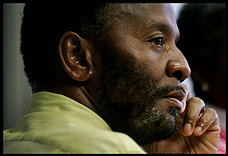 DC Schools Superintendent Janey wants D.C. schools to become "neighborhood hubs of activity." (By Jahi Chikwendiu -- The Washington Post)
DC Schools Superintendent Janey wants D.C. schools to become "neighborhood hubs of activity." (By Jahi Chikwendiu -- The Washington Post)Segregation and poor school quality are definitely issues that we center city urbanists must face if we want to truly revitalize and repopulate the center cities. As an earlier proponent of charter schools, I am now against them, because charter schools have limited transparency and they disconnect schools from the immediate neighborhood in which they are located. Since schools are typically the most dominant public institution in a neighborhood and a major source for neighborhood connection and stabilization, a move to charter schools can be a major source of destabilization.
These are difficult issues, and political correctness prevents us from addressing the issues in a fundamental way.
I think of myself as a progressive, but I find the argument of the decline of inner city municipal institutions as laid out in Siegel's The Future Once Happened Here to be quite compelling. There is also a materiél question, and in not only organizing for school funding (see this paper "Can Community and Education Organizing Improve Inner-City Schools?") but in grappling with issues around re-orienting and reconnecting dysfunctional families not only to the educational system, but questions of resocialization.
Michael Lewyn had a good blog entry not on that but on the difference between urban and suburban school systems in terms of the outcomes really being an inputs question, that if you just switched the student populations from the suburban schools into the cities and vice versa, then the urban schools would dominate positive outcomes.
I have mentioned before that I find the discussion of Brazilian schools in a May or June Harvard Business Review article on "positive deviance" to be quite intriguing.
 Katie Palmer, 9, a 4th grade student at DeBary Elementary School looks for fingerprints on a cup during PTA Mystery night. DeBary Elementary School had its first ever science night for kids and parents.Families worked together on science activities, sleuthing to find out who " stole" the school mascot.(BARBARA V. PEREZ/ORLANDO SENTINEL)
Katie Palmer, 9, a 4th grade student at DeBary Elementary School looks for fingerprints on a cup during PTA Mystery night. DeBary Elementary School had its first ever science night for kids and parents.Families worked together on science activities, sleuthing to find out who " stole" the school mascot.(BARBARA V. PEREZ/ORLANDO SENTINEL)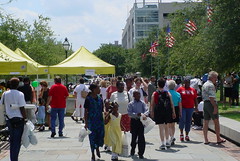 First Day of School Festival, Charleston, South Carolina. Also see the First Day organization website.
First Day of School Festival, Charleston, South Carolina. Also see the First Day organization website.Today's Post has an article about the Education Secretary and her school-aged children ("Off Camera: Margaret Spellings, in Her Own Class"). When one of her children wasn't doing well, she had her make up a "personal education plan" to guide her future performance towards a higher level of achievement. How many low SES parents direct their children in such a fashion?
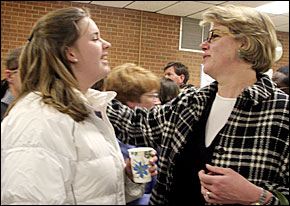 Education Secretary Margaret Spellings with daughter Grace at a student concert at Sandburg Middle School in Alexandria. (Jahi Chikwendiu - Post)
Education Secretary Margaret Spellings with daughter Grace at a student concert at Sandburg Middle School in Alexandria. (Jahi Chikwendiu - Post)Urban school districts need to put a lot more attention into rebuilding family-social-village commitment and involvement in learning, if you want to break the cycle of low performance. Just mixing it up racially won't do it. It's a lot more intricate of a problem than that. Of course that's a tremendous burden for urban school districts to take up.
Have you ever taken a call from a school social worker looking for alarm clock donations, because she says children in her school don't have a responsible adult to wake them up and ensure that they get to school on time? I have...
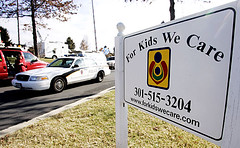 A Montgomery County police vehicle drives past a sign at the Germantown day care center where a 7-year-old girl was shot in the arm. (AP photo)Jan. 24, 2006
A Montgomery County police vehicle drives past a sign at the Germantown day care center where a 7-year-old girl was shot in the arm. (AP photo)Jan. 24, 2006Earlier this week, an eight year old child shot a fellow student, in Germantown Maryland!, but also see this blog entry from Woodridge (Ward 5) which I seem to have missed when it was first posted.
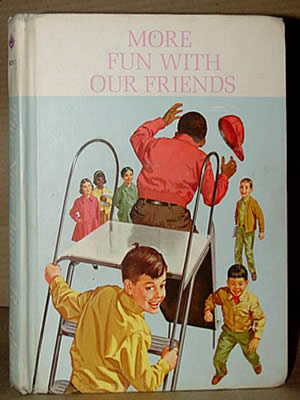 A better more diverse "Dick and Jane" title from the 1960s, with great cover art, is Now we read, but I can't find an image.
A better more diverse "Dick and Jane" title from the 1960s, with great cover art, is Now we read, but I can't find an image.Index Keywords: education



0 Comments:
Post a Comment
<< Home